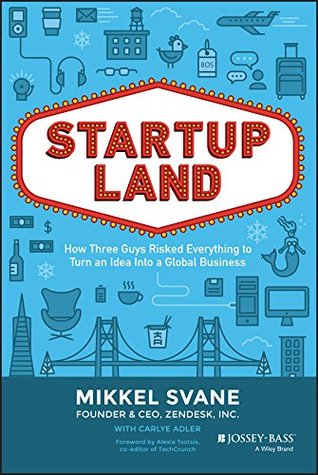More on this book
Kindle Notes & Highlights
by
Mikkel Svane
Read between
March 17 - March 17, 2017
I'm not a big fan of being called a serial entrepreneur. Call me old-fashioned, but nobody brags about how many broken marriages they have behind them.
The thing about money is, it's happening in your head. Everyone processes it differently. People can live with different risk profiles. You have to accept that and not let that come between you. You have to be realistic.
But it was a very borderline time for all of us. You are balancing two extremes: one, you are completely invested and narrowly focused and wholly dedicated; the other, you are hyperaware that there is very little chance you will make it. You are at odds with yourself, consumed by both ecstasy and fear. You have no balance, but you have found meaning. This is the every day, every moment dilemma of a startup.
He was not shy about asking us to produce copious documentation: details on how we fit into the competitive market, addressable market, go-to-market plan, and so on and so forth. He wanted a lot of the usual stuff that is purely fantasy so early in a startup's life.
Michael always said that the more time you spend internally with a company, sitting around a meeting table facing each other—discussing, arguing, or agreeing with each other—the more time you spend showing your rear ends to your customers. It's simple, but there's a big degree of truth to it.
The investment made in a founder and in helping him or her develop leadership skills is the difference between really good investors and mediocre ones.
He compared anybody's career to the hours in the day: although no two lives are the same, we will all experience dawn, noon, dusk, and midnight. Peter was appreciative of the fact that success and the stardom that comes with it are something you experience temporarily. It comes and it goes. So, as with all things that will be taken away from you, there's no reason to get used to it.
Today “Hire for Attitude, Train the Skills” has become a Silicon Valley practice, and Michael was having a field day with it back then in 2009.
I learned that even if your intentions are the best and you are trying to make things simple, you can still destroy everything with a single wrong interaction in which you forget the basic principle for any type of personal interaction: empathy.
We learned in a short time that passionate users are a great help in selling the business, but if they feel mistreated, they will turn around and in no time be just as passionate about hating you.
When it comes to pricing, we also learned that you don't raise your price for an existing product for existing customers. That's the relationship of a subscription service. And this makes sense; things get cheaper over time as you democratize the product stack and make it more accessible to more people. And if the mission is to democratize software, that inherently means that it becomes cheaper and cheaper.
The road show is all work. Don't consider it anything else. You'll fly private planes, have people attending to your every need, sleep in the best hotels, and have people waiting for you with cars, umbrellas, planes, whatever. It is all to make sure you do your best work. It is about nothing else. It doesn't make you special. It's just work.


